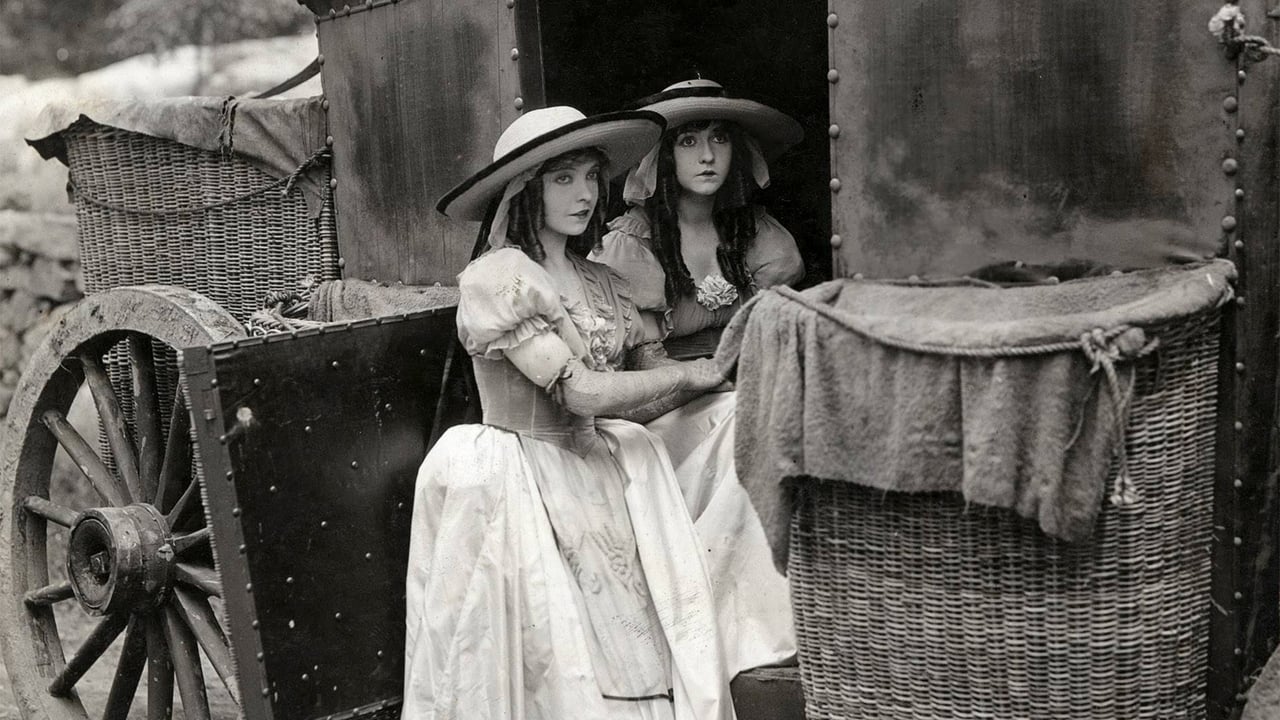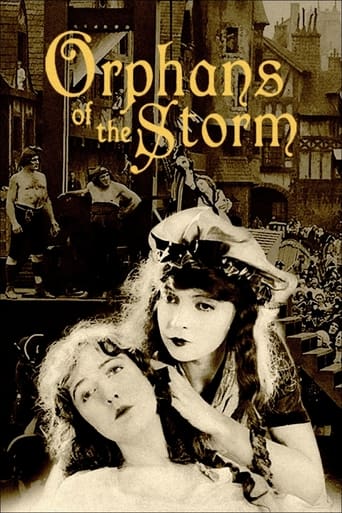

It is a performances centric movie
... View MoreExpected more
... View MoreA film of deceptively outspoken contemporary relevance, this is cinema at its most alert, alarming and alive.
... View MoreThe thing I enjoyed most about the film is the fact that it doesn't shy away from being a super-sized-cliche;
... View MoreTwo orphaned sisters (Lillian and Dorothy Gish) are caught up in the turmoil of the French Revolution, encountering misery and love along the way.The last Griffith film to feature Lillian and Dorothy Gish, it is often considered Griffith's last major commercial success, after box-office hits such as The Birth of a Nation, Intolerance, and Broken Blossoms. Like his earlier films, Griffith used historical events to comment on contemporary events, in this case the French Revolution to warn about the rise of Bolshevism. The film is about class conflict and a plea for inter-class understanding and against destructive hatred.For me, the best Griffith will always be "Broken Blossoms", but his whole method is interesting. Making such epic films to make a political point... it's admirable, and even more admirable considered how much time must have went into making such long films at that point in time. I can only imagine how much film he had to burn through to get what he ended up with.
... View MoreFrom director D.W. Griffith (The Birth of a Nation), this silent film featured near the beginning of the book 1001 Movies You Must See Before You Die, and I was looking forward to seeing what it was about. Basically stepsisters Henriette Girard (Lillian Gish) and Louise Girard (Dorothy Gish) were less alone after the loss of the parents who looked after them, Louise being abandoned by her true birth mother and found on a staircase, and the sisters have grown up as orphans. It is the time before the French Revolution, and Louise has become blind, Henriette vows to take care of her, until the possibility that somewhere in Paris there may be a cure. Marquis De Praille (Morgan Wallace) is the lusting aristocrat, who kills the child of Jacques-Forget-Not (Leslie King), and he has Henriette abducted as he is besotted with her virginal beauty. While Louise is left helpless and alone, she is kidnapped by Mother Frochard (Lucille La Verne) and forced to help make the old hag the money that she lusts for, the old woman is using her blindness and vulnerability for profit. Chevalier De Vaudrey (Joseph Schildkraut) is the honourable aristocrat who helps Henriette escape her abduction, and he kills De Praille in a duel, but together the two of them cannot seem to find her stepsister. While renting in the house of the aristocrat, she meets Danton (Monte Blue), a politician she allows to stay with her after he got away from an attack by Royalist spies, and he falls for her, which his revolutionary friend Robespierre (Sidney Herbert) isn't approving of. While Louise continues having to beg, Henriette is proposed to by De Vaudrey, which she turns down, but he promises her that her sister will be found, and when King Louis XVI (Lee Kohlmar) finds out about his choice of wife, he orders that she be arrested. While Chevalier is sent away, and before the police come for her, Henriette is visited by Cheavalier's Aunt, who remembers from Henriette's discussion of her missing sister that she is the baby that she abandoned on a staircase. At the same moment Louise is singing and begging blindly down the street near the house, with Frochard nearby, and Henriette overhears and calls from the balcony to her sister, and that is when the blind sister is dragged away, and the other is arrested. At the same time as Louise being forced to continue begging, The French Revolution starts, with cannons firing and men charging with swords, with many people dying in the battle, and prisoners, including Henriette, being freed from captivity. Henriette and Chevalier, with Louise listening, are sentenced to be executed on the guillotine by Robespierre and Forget-not, but they are saved by Danton after getting them a pardon, saying that only Louise's sister can look after her. In the end the two orphans are finally reunited, Louise is happy to have her eye sight restored and see her sister Henriette, and the France has a better Republic formed. Also starring Frank Losee as Count De Linieres, Katherine Emmet as Countess De Linieres, Sheldon Lewis as Jacques Frochard and Frank Puglia as Pierre Frochard. Having seen The Artist I was keen to see many more great silent films, and I don't know why this film isn't considered more of a masterpiece, i.e. five stars out of five, because it does really draw you in with its absorbing material and a magnificently emotional story, it is a fantastic silent period melodrama. Very good!
... View MoreWith the French Revolution as backdrop DW Griffith exposes his constant heroine Lillian Gish to depraved aristocrats and blood thirsty revolutionaries in Orphans of the Storm. Made during the Red Scare in America Griffith takes the opportunity to promote democracy and denigrate runaway Bolshevism in this silent epic filled with his signature montage and grand compositions.Louise (Dorothy Gish) the abandoned daughter of an aristocrat is taken in by the destitute Girards. Raised as a sister with Henriette she loses her sight but has a fierce protector in her sibling who travels with her to Paris on the eve of full revolt led by Danton and Robespierre. Through the diabolical machinations of of an aristo she is separated from her sister and spends most of the film attempting to re-unite with her and avoid the guillotine. In her search she is assisted by the aristocrat DeVaudry (Joseph Schildkraut) as well as Danton (Monte Blue) who can find time from overthrowing the country to rescue Henriette from the blade. Griffith straddles the fence in this history piece with praise for individuals but condemnation for both sides. Most of the aristocrats are degenerates, the revolutionaries blood lusting and depraved and Griffith fills his canvases with scenes of bacchanalian reverie and sadistic cruelty to drive the point home. Danton may be a champion of the people but Robespierre and Jaques "Never Forget" seem bent on revenge and blood letting while the decent side of the aristos is represented by Henriette's compassionate pursuer DeVaudry.Politics aside Storm is filled with sumptuous sets and crowd scenes that convey the frenzy of the moment and the accompanying delirium of be headings and dancing in the street. Lillian Gish is both delicate and determined and in scenes with Dorothy the two are quite touching to watch. Monte Blue's Danton is a bit over the top but the sharp venal features of Robespierre and Jaques Never Forget seething with hatred express themselves perfectly with a mere look. While it may not be the mega epic that Intolerance and Birth of a Nation are Orphans of the Storm proves that size isn't everything and it remains one of Griffith's best efforts.
... View MoreHenriette (Lillian Gish) and her sort-of adoptive sister Louise (Dorothy Gish) must travel to Paris on the eve of the French revolution so that Louise can have an operation to reverse the blindness she suffered as a result of the plague (which also claimed her adoptive parents). However, they soon become separated once in Paris: while Louise is left at the mercy of an unscrupulous beggar woman, Henriette finds herself the target of a salacious nobleman with plans to ravish her at his midnight orgy.How's that for bodice-ripping melodrama? D. W. Griffith, who could still just about do no wrong back in 1921, produced yet another drama on an epic scale, little realising he was on the cusp of an irreversible decline that would see him unable to win work of any kind within a decade. There's little sign of his powers waning here as he delivers a big, ambitious spectacle that sets the intimate relationship of two half-sisters against the broad canvas of the French revolution. Judging from the inter-titles, Griffith's prime motivation was to highlight the similarities between the manipulation of the revolution by such men as Robespierre with the then-recent revolution in Russia and the dangers of such an event occurring in (gasp!) America. Of course, we all now know that D. needn't have worried himself, but his sincerity is certainly evident in the attention to detail, and the lavish sets and costumes of the film. The debauched midnight party is something to behold, and put me in mind of all those modern day films and videos in which young and edgy directors think they're doing something special by adding a kitsch glamour to the frocks and wigs of the noble women in their period films. The fact is Griffith was eighty years ahead of them.Sadly, as with most of Griffith's films when viewed today, there's a down-side due to the horrendous over-acting of some of his players. Lillian Gish is OK most of the time – she always seemed to exercise an admirable restraint in her performances no matter who she was working under – but her little sister Dorothy goes over the top a little too often. Even she is outplayed by Monte Blue, who plays Danton, in his big climactic scene; clutching one hand to his chest, he holds his other aloft as if tightly grasping a half-inflated balloon partially filled with water, and pulls wild faces as he begs the People's Court to have mercy on the poor little orphans. As a device to emphasise the drama of the moment it no doubt worked fine ninety years ago, but today such displays border on the comical.The pace of the film is surprisingly good considering its age and running time – a bum-numbing 150 minutes – and despite introducing the audience to a large cast of characters within the first ten or fifteen minutes, Griffith does a good job of not confusing his audience. Needless to say, the last reel, with the customary race against time to save the imperiled heroine, is a master-class in cross-cutting and still manages to get pulses racing even today.Despite the melodramatics from certain members of the cast, I found Orphans of the Storm a more accessible and enjoyable film than the likes of Birth of a Nation and Intolerance, which are held in higher esteem by most people. Griffith's touch seems much more assured than with BoaN, and the storyline is obviously less fragmented than it is in Intolerance.
... View More